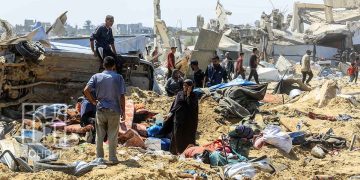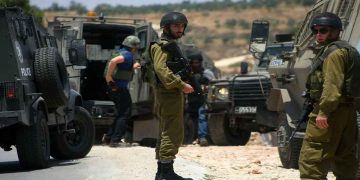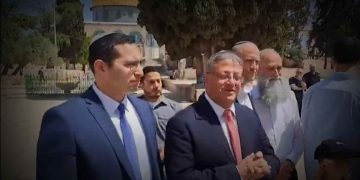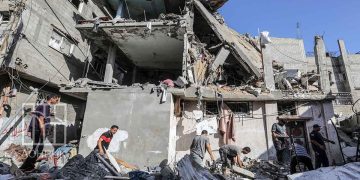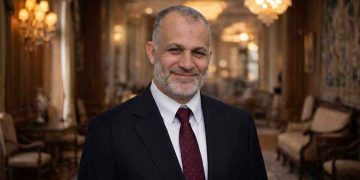On the evening of September 15, 2023, Arab Organisation for Human Rights in the UK (AOHR UK) organised a timely and crucial webinar. The event was prompted by the recent surge in violent incidents and oppressive actions undertaken by Israeli authorities, notably those spearheaded by Itamar Ben Gvir. Recognising the urgency of these troubling developments, the organisation felt compelled to swiftly convene this significant online gathering.
Dr. Shahd Abusalama, a Palestinian feminist writer and activist, skillfully moderated the webinar, setting the stage for a rich and insightful discussion. The lineup of speakers brought diverse perspectives and expertise to the table, ensuring a comprehensive examination of the pressing human rights issues at hand.
In her contribution, Sahar Francis, Advocate and Director of Addameer, a Palestinian non-governmental organisation focused on human rights, shed light on the worsening conditions faced by Palestinian prisoners in Israeli jails.
Francis began her remarks by stating that there are currently around 5,000 prisoners in Israeli prisons, including about 165 children and 183 women. She also highlighted the plight of more than 1,200 administrative detainees and mentioned that four members of the Palestinian Legislative Council are still under detention in Israeli prisons.
According to Francis, the situation for Palestinian prisoners has worsened dramatically since the escape of six prisoners from Israel’s most secure prison, Gilboa, two years ago. “Since then, there has been a policy of collective punishments, isolation, and frequent transfers of prisoners from one facility to another,” she said.
Francis criticized the role of Interior Security Minister Ben-Gvir in exacerbating the conditions for prisoners. “When Ben-Gvir took over the Interior Security Ministry, he immediately began imposing measures to make the daily life conditions of prisoners more difficult,” she noted. Among these measures are restrictions on shower times and transfers often occurring on the same day as scheduled family visits.
Francis also spoke about changes in the legal system affecting prisoners, such as altering the early release policy for those sentenced to less than three years. She added that family visits have been limited to once every two months for just half an hour, according to current prison regulations.
Francis lamented the loss of Khader Adnan, a well-known detainee who initiated more than 500 individual hunger strikes over the last 10 years. Adnan lost his life on the 87th day of his hunger strike this year. “Khader wasn’t supposed to face this serious situation but they refused to release him on condition, they refused to transfer him to a normal hospital to be treated, and he was isolated alone all the 87 days he was denied family visits,” she said.
Francis concluded by stating that Adnan’s death “reflects the complicity of the whole occupation system, the judicial system, whether in the military court system or the Israeli High Court or the prison authority system, in the operation against the prisoners.”
Zarefah Baroud, a PhD candidate at the University of Exeter’s European Centre for Palestine Studies, spoke candidly about the deteriorating conditions for Palestinian prisoners in Israeli jails. Baroud emphasized that Israel’s punitive measures against prisoners are part of a broader strategy that has deep historical roots.
“It’s crucial to acknowledge that Israel’s war surpasses its prison walls in many respects, particularly in its recent policies concerning Palestinian prisoners,” Baroud said. She argued that prisons have always been a key strategy for Israel’s occupation, noting that over 700,000 Palestinians have experienced detention, constituting 40% of the entire male Palestinian population.
Baroud criticized National Security Minister Itamar Ben-Gvir for making it clear that punitive measures against prisoners are part of his strategy. “Many of these measures target what Ben-Gvir refers to as ‘luxury conditions’ in Israeli prisons, which in reality are basic human rights like sustenance and family life,” she said.
Baroud detailed the reality of prison conditions, which include constant physical and psychological torture, such as solitary confinement and denial of medical care. She cited a recent study by Save the Children that revealed over 70% of Palestinian child detainees have reported suffering from hunger in prison. “Israeli prison authorities have even confiscated fans during heatwaves, exacerbating the already poor conditions in these rundown facilities,” she added.
Ben-Gvir has accused Palestinian prisoners of wasting water and has restricted shower times to just 4 minutes, risking the spread of disease. “Ben-Gvir is also cracking down on Palestinian bakeries within prisons, calling the ability to bake bread a ‘luxury’ and an ‘absurdity,'” Baroud said.
Baroud pointed out that Israel’s administration rarely objects to these policies on the basis of human rights; their objections are usually framed as security concerns. She also mentioned that prison transfers are another punitive measure that impacts prisoners’ right to family life, often isolating them from their loved ones for months.
“Israel has strategically moved all prisons into Israel proper, making it nearly impossible for Palestinians in the occupied territories to visit their incarcerated family members,” Baroud said. She highlighted the Negev prison, located in the middle of the desert, as being used to break up organising efforts and further isolate prisoners from their families.
Baroud concluded by stating, “It’s inaccurate and dangerous to see these violations as the invention of an individual; they are a continuation of Israel’s ever-escalating policy against Palestinian prisoners.” She noted that Israel has essentially copied its detention policies and military courts from the British Mandate Handbook, continuing a long history of dehumanizing treatment.
Bill Law, Editor of Arab Digest and former MENA analyst for the BBC, offered a scathing critique of Israeli policies and international complicity during his speech in the webinar. Law touched on a range of issues, from administrative detention to the role of Western governments in supporting Israel.
Law began by highlighting the unique nature of Israel’s administrative detention policies. “As of June, there were eighteen children being held in administrative detention, a practice by the Israel Police that is unlike anything else in the world,” he said. He added that even when compared to “viciously repressive regimes,” Israel’s administrative detention stands out as a “very telling statement.”
Law emphasized that National Security Minister Ben-Gvir is not the originator of these policies but has driven them forward in a way that hasn’t been so openly practiced before. “With Ben-Gvir and Smotrich, you have fascists. They’re using settlers as the tip of the spear to drive Palestinians out of the West Bank,” Law stated.
“Area C is the first target, and Bedouin communities are being driven off their lands with the IOF enabling it,” he said. Law also noted that almost no Palestinians remain in a vast area stretching east of Ramallah to the outskirts of Jericho due to intensifying land seizures backed by the Israeli occupation forces.
Law criticized Western governments, particularly the United States, for their role in supporting Israel. “Joe Biden is working hard to get the Saudis to recognize Israel, which will benefit Netanyahu hugely if it happens,” he said. He also mentioned that Mohammed bin Salman would be delighted to join diplomatic circles with Israel.
Law did not spare the Palestinian Authority from criticism. “The Palestinian Authority has abandoned their people and has been responsible for some terrible atrocities inflicted upon their own population,” he said. He added that Mahmoud Abbas and the Palestinian Authority are viewed with contempt by his Palestinian friends as collaborators in the occupation.
Law concluded by stating that the court of global opinion is starting to turn. “Social media is very important in getting out pictures of the daily abuse of Palestinians,” he said. He expressed hope that the current Israeli government would eventually “devour itself” due to its extreme policies.
Ken Roth, a prominent human rights activist and former executive director of Human Rights Watch, delivered a powerful address at a recent webinar, in which he accused Israel of committing apartheid and persecution against Palestinians. Roth emphasized that these claims were not drawn from historical analogies but based on international law.
“In our report from three years ago, Human Rights Watch found that this repression amounts to a crime against humanity, specifically apartheid,” Roth declared. He clarified that this accusation was not a historical analogy to South Africa but an application of international law, particularly the UN Convention against Apartheid and the Rome Statute of the International Criminal Court.
Roth elaborated on the elements of apartheid, stating, “These treaties define apartheid as having three essential elements: an intent to dominate by one racial group over another, systematic oppression, and inhumane acts as manifestations of that oppression.” He further explained that HRW had found evidence of these elements in Israel’s policies.
“We found that the intent to dominate existed from the river to the sea. While there was systematic discrimination within the 1967 Israel Green Line, there was also systematic oppression within the occupied territories, including the West Bank, East Jerusalem, and Gaza,” Roth asserted.
Roth argued that Israeli practices were more about demographic engineering than ensuring safety and security. He provided an example of Palestinian families in the West Bank who face restrictions on expanding their homes, which, he said, were not about security but control.
Addressing the proliferation of settlements and outposts, Roth contended, “The peace process, which might have had credibility in the first decade after Oslo, is now completely moribund.” He emphasized that the one-state reality on the ground had turned the West Bank into isolated Palestinian enclaves.
He further criticized the continued adherence to outdated visions by some parties and the lack of progress in holding elections within the Palestinian Authority.
Roth also touched on the issue of accusations of antisemitism against those who criticize Israel. He argued, “Using charges of antisemitism to silence criticism of Israel actually harms the effort to combat real antisemitism.” He highlighted the importance of distinguishing between legitimate criticism and baseless accusations.
Roth concluded with a pointed comment about Israeli Prime Minister Benjamin Netanyahu, saying, “Netanyahu seems to care less about Jews around the world who haven’t done Aliyah to Israel, cosying up to people like Viktor Orbán, a blatant anti-Semite.”
Rula Shadeed, Advocacy & Programme Director at PIPD, delivered a thought-provoking address at a recent webinar, shedding light on the challenges faced by Palestinians and the imperative need for a shift in the narrative surrounding their cause.
Shadeed began by drawing attention to the erosion of democracy in Western countries and how their failure to hold Israel accountable signaled a concerning trajectory. “Democracy is under threat in many Western countries, and their failure to hold Israel accountable for its actions is a sign of where we are heading,” she warned.
Shadeed emphasized that figures like Ben-Gvir and Smotrich were not unique but rather integral to a colonial project in Palestine spanning over seven decades. “What the Palestinians are facing is not new; it’s just different governments having different administrations to proceed with their actions against Palestinians,” she noted.
“The issue of dominance is intertwined with apartheid, colonialism, and occupation, all legal frameworks applicable to the Palestinian cause,” Shadeed stated, highlighting the multifaceted nature of the Palestinian struggle.
Shadeed discussed the issue of Palestinian political detainees and prisoners, numbering over 6,000. She argued that this was a manifestation of the issue of dominance, as the Israeli occupation state used arrests and detentions as a means of controlling the Palestinian population and suppressing political activity.
Shadeed also delved into the expansive definitions of ‘security’ under Israeli military laws, which encompassed political expression. She mentioned Military Order 101 from 1968, which criminalized protests or meetings of ten people or more without permission from the military commander, thereby impacting Palestinian civic life.
“Political parties that comprise the Palestine Liberation Organisation are still considered to be illegal organisations under Israeli military regulations,” Shadeed explained. She noted that human rights work had also been criminalized, with anything potentially falling under the vague label of ‘security.’
Shadeed emphasized that the Palestinian struggle was not about one-state or two-state solutions but rather about ending occupation, colonization, and achieving self-determination for the Palestinian people.
“Maintaining prisoners in Israeli prisons is also a profitable business for Israel,” Shadeed added, underscoring the financial incentives behind the imprisonment of Palestinians.
“We need to change the narrative; it’s not a conflict, it’s colonization,” Shadeed urged. She emphasized the importance of shifting the narrative to focus on what Palestinians truly desired rather than adhering to a Western obsession with an unattainable two-state solution.
Rula Shadeed’s remarks highlighted the multifaceted challenges faced by Palestinians and called for a reevaluation of the narrative surrounding their cause, emphasizing the urgent need to address the issues of occupation and colonization.
Legal Researcher and Advocacy Officer at Al-Haq, Aseel AlBajeh, spoke at the webinar, describing 2022 as one of the deadliest years for Palestinians in the West Bank. She emphasized that the increase in violence is not solely the result of a far-right government but part of a broader, long-standing policy against Palestinians.
“The increase in killings should not be attributed solely to any so-called far-right government. It’s important to understand these actions within the broader context of a logic of elimination against Palestinians,” AlBajeh said. She added that this logic is part of the settler-colonial project and the apartheid regime that has been in place since 1948.
AlBajeh argued that the use of killings and excessive force is just one tool to maintain this apartheid regime. “When we talk about the occupation in the West Bank and Gaza, it’s an extension of these broader oppressive regimes,” she said.
AlBajeh stressed the importance of not fragmenting the Palestinian people. “All these policies are directed against the Palestinian people as a whole, wherever they are located,” she noted.
AlBajeh described the situation in the West Bank as witnessing an unprecedented use of military offensives, the likes of which haven’t been seen since the Second Intifada. “We have observed the use of aerial drones and advanced military methods in densely populated residential areas in Nablus and Jenin,” she said.
AlBajeh pointed out that Israeli occupying forces have used Palestinian homes as military bases for shelling and killing, even while families, including children, are present. “Residents describe attacks as if Israeli forces were shooting at any moving Palestinian, part of a ‘shoot-to-kill’ policy,” she added.
AlBajeh also highlighted that Israeli forces disrupt medical services by surrounding camps with military vehicles and preventing ambulances from entering. She cited the example of a 60-year-old Palestinian woman who was shot by an Israeli sniper while looking through her window during a raid on the Jenin refugee camp.
“These military attacks are not the actions of a far-right or fascist government; they are how Israel’s settler-colonial regime views Palestinians,” AlBajeh concluded.
AlBajeh ended her remarks by emphasizing that young Palestinians leading the resistance have been born into ongoing occupation and colonization. “These Palestinians have the right to resist this colonial domination, illegal apartheid regime, and illegal Israeli occupation,” she said.
In his contribution, Chris Osieck, an Open-Source Researcher at Coeus Collective, shed light on the powerful role of open-source research in documenting Israeli occupation forces’ actions in the West Bank and Gaza. Osieck and his team have been diligently collecting digital evidence to challenge the hegemonic narrative and promote justice and accountability.
“The Israeli occupation forces regularly raid the occupied West Bank almost daily, but I want to highlight a form of resistance: filming these incidents and sharing them online,” Osieck began, emphasizing the importance of exposing the daily reality faced by Palestinians.
Osieck noted that while sharing videos online was crucial, there were challenges, such as the risk of videos getting lost and tech firms deprioritizing Palestinian posts. “We collect digital evidence, archive them, and map them into a database to document Israeli violations,” he explained.
Osieck stressed that the violence documented wasn’t unique to the current government but rather a structural issue that had persisted. “We geolocate videos and plot them on a map to create a visualized story that challenges the hegemonic narrative,” he added.
“In a recent incident in Beita, a man was shot in the back while trying to help another Palestinian. The Israeli forces claimed it was due to violent riots, but our open-source evidence proves otherwise,” Osieck pointed out. The team uses satellite imagery to cross-reference geographical features seen in the videos.
“We have around 600 videos documenting violence by Israeli occupation forces in the West Bank and Gaza,” Osieck revealed. These videos are archived online, in Bellingcat’s auto-archiver, and offline on a USB stick.
Osieck explained their categorization process, which involves when, where, what, and at what time an incident occurred, with the ultimate goal of bringing more justice and accountability. “This work isn’t done alone; it’s a team effort involving multiple researchers,” he noted.
“While open-source methods are powerful, they have limitations. Oral testimony and evidence from the field add an extra layer of depth,” Osieck emphasized. Coeus Collective has begun collaborating with Forensic Architecture at al-Haq organisation to combine efforts and data.
“One of the most rewarding aspects of this work is that we’re helping Palestinian researchers directly,” Osieck said, highlighting the significance of their efforts in supporting those affected by the occupation.
“Tech firms like Facebook are practicing a form of digital apartheid by giving preference to Hebrew language posts and silencing Palestinian voices,” Osieck stated, highlighting the challenges faced in disseminating their evidence.
“We’re working towards making our database public so that people can verify the incidents themselves, raising awareness of the violence committed by Israeli occupying forces and settlers,” Osieck concluded, underscoring the importance of transparency and raising global awareness of the ongoing situation.
Chris Osieck and the Coeus Collective’s work serves as a testament to the power of open-source evidence in documenting human rights violations and challenging dominant narratives.

